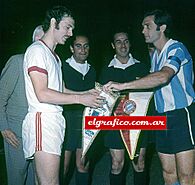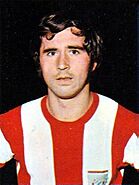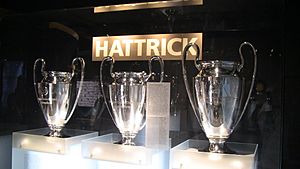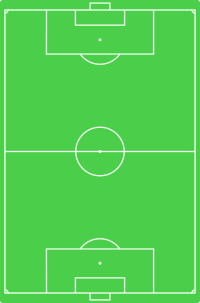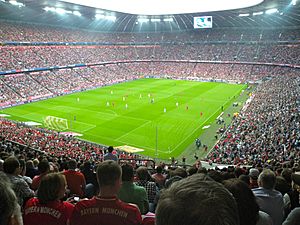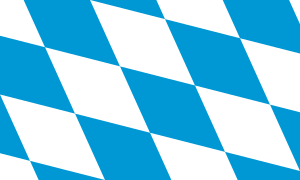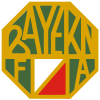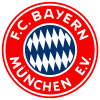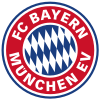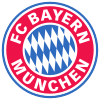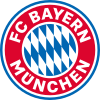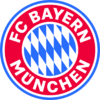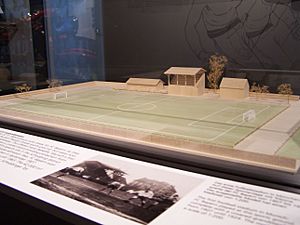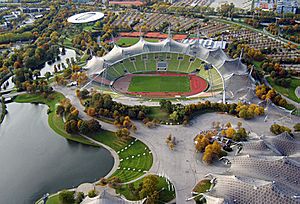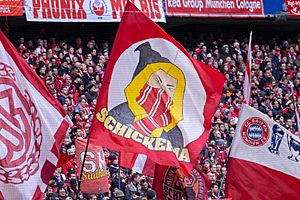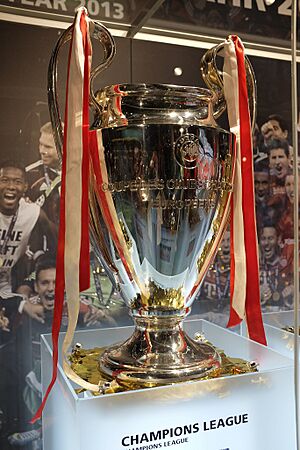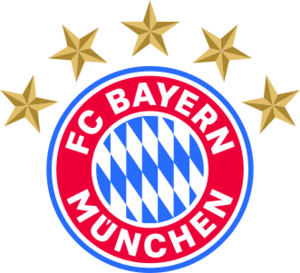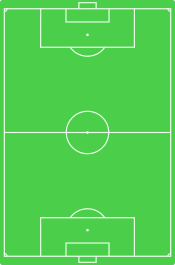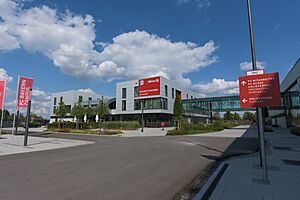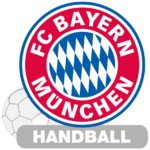FC Bayern Munich facts for kids
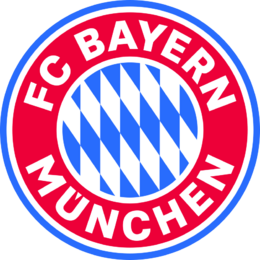 |
|||
| Full name | Fußball-Club Bayern München e. V. | ||
|---|---|---|---|
| Nickname(s) |
|
||
| Short name |
|
||
| Founded | 27 February 1900 | ||
| Stadium | Allianz Arena | ||
| Stadium capacity |
75,024 | ||
| President | Herbert Hainer | ||
| CEO | Jan-Christian Dreesen | ||
| Head coach | Vincent Kompany | ||
| League | Bundesliga | ||
| 2020–21 | Bundesliga, 1st of 18 (champions) | ||
|
|
|||
Bayern Munich (officially Fußball-Club Bayern München e. V.) is a famous German sports club from Munich, Bavaria. They are best known for their men's professional football team. This team plays in the Bundesliga, which is the top football league in Germany. Bayern is the most successful club in German football history. They have won a record 34 national titles and 20 national cups. They also have many European titles.
Bayern Munich was started in 1900 by eleven players, led by Franz John. They won their first national championship in 1932. The club became very successful in the 1970s. Led by Franz Beckenbauer, they won the European Cup three times in a row (1974–1976). Overall, Bayern has won six European Cup/UEFA Champions League titles. This is a German record. They won their sixth title in 2020 as part of a "Treble" (winning three major trophies in one season).
Bayern is one of only five teams that have earned the right to keep the European Cup trophy forever. They also wear a special badge for winning it multiple times. The club has won other big European and international trophies. These include one UEFA Cup, one European Cup Winners' Cup, two UEFA Super Cups, two FIFA Club World Cups, and two Intercontinental Cups. This makes them one of the most successful European clubs worldwide.
In 2020, Bayern Munich became only the second club to win the "sextuple". This means they won all six possible trophies in a calendar year. These were the League, Cup, and Champions League in one season. Then, they won the Domestic Supercup, UEFA Supercup, and Club World Cup in the next season. Bayern Munich is one of five clubs to have won all three of UEFA's main club competitions. They are the only German club to do this.
Bayern Munich is one of the most popular football clubs in the world. In July 2025, they had over 400,000 official club members. They also had 4,286 fan clubs with more than 325,000 members. This makes them the largest sports club in the world by membership. The club also has other sports departments like basketball, gymnastics, and table tennis. Since 2005, Bayern has played its home games at the Allianz Arena. Before that, they played at the Olympiastadion for 33 years. The team's colors are red and white. Their crest shows the white and blue flag of Bavaria.
Contents
Club History
Early Years (1900–1960s)
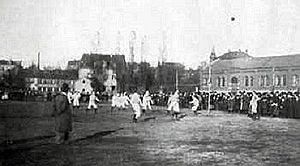
Bayern Munich was founded on February 27, 1900. Eleven football players left a gymnastics club to start their own team. In their first few months, Bayern won many games against local rivals. They even won 15–0 against Nordstern. They reached the semi-finals of the South German championship in 1900–01.
In 1910–11, Bayern joined the new "Kreisliga," the first regional Bavarian league. They won this league in their first year. By 1920, Bayern had over 700 members, making it the biggest football club in Munich. Their first national title came in 1932. Coach Richard Kohn led the team to win the German championship. They beat Eintracht Frankfurt 2–0 in the final.
The rise of Adolf Hitler in Germany stopped Bayern's progress. The club president and coach, who were Jewish, had to leave the country. Many others were also removed from the club. Bayern was called the "Jew's club." After World War II ended in 1945, Bayern struggled. They hired and fired 13 coaches between 1945 and 1963. In 1955, the club was moved down to a lower league. But they quickly returned and won the DFB-Pokal (German Cup) for the first time in 1957.
The club faced money problems in the late 1950s. But a new president, Roland Endler, helped them become financially stable. In 1963, Germany's top football leagues were combined into one national league, the Bundesliga. Bayern was not chosen to join at first. But in 1965, with young stars like Franz Beckenbauer, Gerd Müller, and Sepp Maier, they earned their way into the Bundesliga.
Golden Years (1960s–1970s)
In their first Bundesliga season (1965–66), Bayern finished third and won the DFB-Pokal. This allowed them to play in the European Cup Winners' Cup the next year, which they won. Franz Roth scored the winning goal in a 1–0 extra time victory against Rangers. In 1967, Bayern won the DFB-Pokal again.
In 1969, under coach Branko Zebec, Bayern won both the league and the cup. This was the first time a Bundesliga team achieved this "double." Udo Lattek became coach in 1970. He led Bayern to their third German championship in 1972. The deciding match was the first game played in the new Olympiastadion. Bayern won the next two championships as well.
Their biggest success came in 1974 when they won the European Cup against Atlético Madrid. This win showed that Bayern was a major force in international football.
Bayern defended their European title in 1975 by beating Leeds United. A year later, in 1976, another goal from Roth helped them defeat Saint-Étienne. Bayern became the third club to win the trophy three years in a row. The last trophy of this era was the Intercontinental Cup, which they won against Brazilian club Cruzeiro. After 1977, many key players like Franz Beckenbauer and Gerd Müller left the team. The club did not win any more titles for the rest of the decade.
From "FC Breitnigge" to New Success (1970s–1990s)
The 1980s were a challenging time for Bayern off the field, with many changes and financial issues. On the field, Paul Breitner and Karl-Heinz Rummenigge led the team to Bundesliga titles in 1980 and 1981. After a few less successful seasons, coach Udo Lattek returned. Bayern won the DFB-Pokal in 1984 and then five Bundesliga championships in six seasons. This included another "double" (league and cup) in 1986. However, they did not win any European titles during this time.
Jupp Heynckes became coach in 1987. Bayern won two more championships in 1989 and 1990. But then their performance dropped. In 1993–94, Bayern was knocked out of the UEFA Cup by Norwich City. This was the only English club to beat Bayern at the Olympiastadion. Franz Beckenbauer took over as coach for the second half of the 1993–94 season. He led them to win the championship again after four years. Beckenbauer then became the club president.
The next coaches, Giovanni Trapattoni and Otto Rehhagel, did not win any trophies. During this time, Bayern's players were often in the news for things happening off the field. Franz Beckenbauer briefly returned as a temporary coach in 1996. He led the team to win the UEFA Cup. Trapattoni returned for the 1996–97 season and won the championship. But in the next season, Bayern lost the title to 1. FC Kaiserslautern, and Trapattoni left again.
International Triumphs (1990s–2000s)
Ottmar Hitzfeld coached Bayern from 1998 to 2004. In his first season, Bayern won the Bundesliga. They almost won the Champions League but lost 2–1 to Manchester United in the final. The next year, Bayern won their third "double" (league and cup). In 2001, they won their third Bundesliga title in a row. Days later, Bayern won the Champions League for the fourth time. They beat Valencia in a penalty shootout.
The 2001–02 season started with a win in the Intercontinental Cup. In 2002–03, Bayern won their fourth double. Hitzfeld's time as coach ended in 2004. Felix Magath took over and led Bayern to two more doubles. In 2005, Bayern moved to the new Allianz Arena. In 2007, Hitzfeld returned as coach. But Bayern finished fourth in the league, missing out on the Champions League for the first time in over ten years.
Domestic Success and Treble Wins (2000s–2010s)
For the 2007–08 season, Bayern brought in new players like Franck Ribéry, Miroslav Klose, and Luca Toni. Bayern won the Bundesliga easily and also the DFB-Pokal. After this, their long-time goalkeeper Oliver Kahn retired. Coach Ottmar Hitzfeld also retired. Jürgen Klinsmann became the new coach. However, Klinsmann was fired before his first season ended. Jupp Heynckes became a temporary coach and led the club to finish second in the league.
For the 2009–10 season, Bayern hired Dutch manager Louis van Gaal. Dutch forward Arjen Robben also joined. Robben and Ribéry became known as "Robbery" and were key to Bayern's attacking style. Bayern had their most successful season since 2001. They won the domestic double and reached the Champions League final, but lost to Inter Milan. Van Gaal was fired in April 2011.
Heynckes returned for his second full period as coach in 2011–12. Bayern signed Manuel Neuer and Jérôme Boateng. But they finished second in the league and cup to Borussia Dortmund. They also lost the Champions League final at their home stadium, the Allianz Arena, to Chelsea on penalties.
Bayern Munich then won all titles in the 2012–13 season. They set many Bundesliga records and became the first German team to win the "treble" (league, cup, and Champions League). Bayern finished the Bundesliga with 91 points.
In the 2013 Champions League final, Bayern beat Borussia Dortmund 2–1. A week later, they won the DFB-Pokal final against Stuttgart to complete the treble. The club announced that Pep Guardiola would be the coach for the 2013–14 season.
Guardiola's first season started well. Bayern extended their unbeaten league run to 53 matches. They won the league title early. Bayern also won the FIFA Club World Cup and the UEFA Super Cup. The UEFA Super Cup was the last major trophy the club had not yet won. Bayern also won the cup in 2014, but lost in the Champions League semi-finals to Real Madrid. Under Guardiola, Bayern won the Bundesliga again in 2015 and 2016, including another double in 2016. But they did not get past the Champions League semi-finals.
Carlo Ancelotti became the next coach. In November 2016, Uli Hoeneß was re-elected as president. Under Ancelotti, Bayern won a fifth league title in a row. In 2017, 1860 Munich left the Allianz Arena. Ancelotti was fired in September 2017 after a big loss in the Champions League. Jupp Heynckes returned as coach for the rest of the season. He led the club to another championship. Niko Kovač was named Heynckes' successor. In Kovač's first season, Bayern was knocked out of the Champions League in the round of 16. But they won their seventh straight Bundesliga title. A week later, Bayern won their 19th German Cup, completing their 12th domestic double.
Recent Years (2019–Present)
Kovač was fired in November 2019. Hansi Flick became the interim manager. Under Flick, the club won the league, having a very successful second half of the season. They also won the cup, completing their 13th domestic double. In the Champions League, Bayern reached their first final since 2013. They beat Paris Saint-Germain 1–0 in the final. Bayern became the second European club to win the seasonal treble twice.
Bayern started the 2020–21 season by winning the UEFA Super Cup. They also won the FIFA Club World Cup. Bayern became the second club to win the "sextuple." The club also won its ninth Bundesliga title in a row. During this season, Robert Lewandowski broke a record for most goals scored in a Bundesliga season. Flick left at the end of the 2020–21 season. Julian Nagelsmann became the new manager.
Under Nagelsmann, Bayern won its 10th Bundesliga title in a row. In March 2023, Nagelsmann was replaced by Thomas Tuchel. Tuchel led the club to a record eleventh consecutive title, winning a close race with Borussia Dortmund. In August 2023, Bayern signed Harry Kane from Tottenham Hotspur for a record fee. In February 2024, Bayern and Tuchel announced they would part ways after the season. The 2023–24 Bundesliga season was the first in a decade that Bayern Munich did not win the league.
On May 29, 2024, Vincent Kompany was confirmed as the new head coach. Bayern started the 2024–25 Bundesliga season with a win. On May 5, 2025, they won their 34th German title.
Team Colors and Crest
Bayern's original club colors were white and blue. But the club played in white shirts with black shorts until 1905. For most of their early history, Bayern wore white and maroon home kits. In 1968–69, Bayern changed to red and blue striped shirts. From 1974 onwards, Bayern has mostly worn an all-red home kit with white details.
The club's away kit has been many different colors, including white, black, blue, and gold-green. Bayern also has a special international kit. The club's crest has changed several times.
The colors of Bavaria were first included in the crest in 1954. The modern crest is blue, red, and white. It has the colors of Bavaria in the middle. "FC Bayern München" is written in white on a red ring around the Bavarian colors.
- Bayern Munich logo history
Stadiums
Bayern played its first games in the center of Munich. In 1901, Bayern moved to its own field. From 1925, Bayern shared the Grünwalder Stadion with 1860 Munich. This stadium was damaged during World War II. Bayern's record crowd at this stadium was over 50,000 fans.
For the 1972 Summer Olympics, the city of Munich built the Olympiastadion.
The stadium was known for its design. It hosted many big finals, like the 1974 FIFA World Cup. Over time, people felt the stadium was too cold in winter. Also, fans were far from the field.
In 2000, Bayern Munich and 1860 Munich decided to build a new stadium. The Allianz Arena opened in 2005. It is located on the northern edge of Munich. Since August 2012, the stadium's capacity has increased to 75,000 fans.
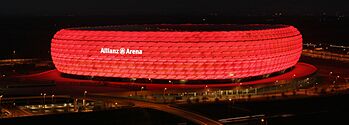
The stadium's most famous feature is its outer layer. It can light up in different colors. Red lighting is used for Bayern home games. In May 2012, Bayern opened a museum about its history, called FC Bayern Erlebniswelt, inside the Allianz Arena.
Supporters
Bayern is the largest sports club in the world by membership. They have over 400,000 official members. The Allianz Arena is always full for every Bundesliga game. Bayern's away games are also sold out. Bayern is one of the most popular football clubs in Europe.
The club's main fan groups include Schickeria München and Inferno Bavaria. Bayern's fan groups are known for standing against unfairness. In 2014, the group Schickeria München received an award for their work against discrimination.
"Stern des Südens" (Star of the South) is a song fans sing at Bayern home games. Another well-known motto is "Mia San Mia" (Bavarian for "we are who we are"). The club's mascot is a bear named "Berni," who joined in 2004. Many famous people support Bayern, including Pope Benedict XVI and Boris Becker.
Rivalries
Borussia Dortmund
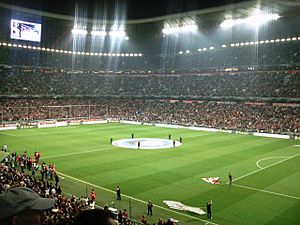
Bayern and Borussia Dortmund are two of the most successful teams in German football. They have won many Bundesliga titles. The rivalry grew in the 1990s as Dortmund started to challenge Bayern. They even met in the 2013 UEFA Champions League final.
In the early 2000s, both clubs continued to be successful. Bayern won the Champions League in 2001. Dortmund won the Bundesliga in 2002. In 2004, Bayern even gave Dortmund a loan to help them with money problems. The two teams played in the 2008 DFB-Pokal final for the first time in Berlin. Bayern won the cup after extra time.
European Rivals
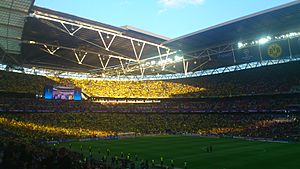
Bayern's main European rivals include FC Barcelona, Real Madrid, AC Milan, and Manchester United. The match between Real Madrid and Bayern has been played most often in the Champions League. Real Madrid fans sometimes call Bayern the "Bestia negra" ("Black Beast") because Bayern has historically been tough to beat.
Club Organization
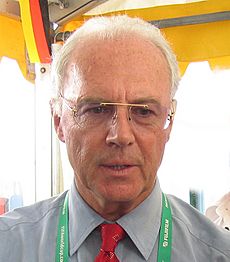
Bayern is mostly led by former club players. From 2016 to 2019, Uli Hoeneß was the club's president. He had resigned in 2014 after facing legal issues. Oliver Kahn was the chairman of the executive board. The club's supervisory board includes leaders from big German companies.
Professional football at Bayern is run by FC Bayern München AG. This is a company whose shares are not traded publicly. The club, FC Bayern München e. V., owns 75% of this company. Three German companies, Adidas, Audi, and Allianz, each own 8.33% of the shares. Adidas bought its shares in 2002 to help pay for the Allianz Arena. Audi bought shares in 2009. In 2014, Allianz became the third shareholder. With this sale, Bayern paid off the remaining debt on the Allianz Arena much earlier than planned.
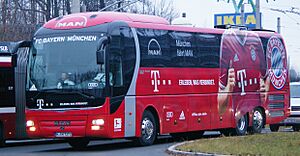
Bayern's main shirt sponsor is Deutsche Telekom. They have been the sponsor since 2002. Adidas has been Bayern's kit manufacturer since 1974.
Bayern is unique in professional football because it has made a profit for 27 years in a row. Other clubs often report losses. In 2019, Bayern had the fourth-highest revenue in club football. Bayern has been focusing its marketing more on Asia and the United States. They opened offices in New York City and Shanghai.
Social Work and Charity
Bayern has been involved in charity for a long time. They help other football clubs that are having money problems. They also help people in need. After the 2004 Indian Ocean Tsunami, the "FC Bayern – Hilfe e. V." foundation was created. This foundation helps organize the club's social work.
The club has helped its local rival 1860 Munich with player transfers and money. When St. Pauli was in danger of losing its professional license, Bayern played a friendly game. All the money from ticket sales went to St. Pauli. In 2003, Bayern gave a €2 million loan to Borussia Dortmund when they were almost bankrupt. Bayern has also played charity games for other financially struggling clubs like Fortuna Sittard, Hansa Rostock, and Kickers Offenbach. In March 2020, Bayern and other top German clubs gave €20 million to help other Bundesliga teams during the COVID-19 pandemic.
In 2013, Bayern was the first club to support the Magnus Hirschfeld National Foundation. This foundation works to create a fair environment for all people in football. In 2016, Bayern received an award for its work in a children's social program called Football for Friendship.
Training Facilities
Bayern Munich's main headquarters and training facility is called Säbener Straße. It is located in Munich. The first team and the reserve team train here. There are five grass fields, two artificial grass fields, a beach volleyball court, and a sports hall.
In August 2017, the club's new sports complex, FC Bayern Campus, opened. It cost €70 million. The campus has eight football fields for youth teams and women's teams. It also has a stadium for youth matches. The Allianz Bayern Akademie is on the campus. It has apartments for young players who do not live nearby.
Honors and Achievements
Bayern is the most successful team in German football history. They have won the most championships and cups. They are also Germany's most successful team in international competitions, with fourteen trophies. Bayern is the only club to have won all three major European competitions. They are also the only club to win three European Cups in a row. They have won the "treble" (league, cup, and Champions League) twice. One of these trebles was part of their "sextuple" in 2020.
| Type | Competition | Titles | Seasons |
|---|---|---|---|
| Domestic | German Champions/Bundesliga | 34 | 1932, 1968–69, 1971–72, 1972–73, 1973–74, 1979–80, 1980–81, 1984–85, 1985–86, 1986–87, 1988–89, 1989–90, 1993–94, 1996–97, 1998–99, 1999–2000, 2000–01, 2002–03, 2004–05, 2005–06, 2007–08, 2009–10, 2012–13, 2013–14, 2014–15, 2015–16, 2016–17, 2017–18, 2018–19, 2019–20, 2020–21, 2021–22, 2022–23, 2024–25 |
| DFB-Pokal | 20 | 1956–57, 1965–66, 1966–67, 1968–69, 1970–71, 1981–82, 1983–84, 1985–86, 1997–98, 1999–2000, 2002–03, 2004–05, 2005–06, 2007–08, 2009–10, 2012–13, 2013–14, 2015–16, 2018–19, 2019–20 | |
| DFB/DFL-Supercup | 10 | 1987, 1990, 2010, 2012, 2016, 2017, 2018, 2020, 2021, 2022 | |
| DFL-Ligapokal | 6 | 1997, 1998, 1999, 2000, 2004, 2007 | |
| Continental | European Cup/UEFA Champions League | 6 | 1973–74, 1974–75, 1975–76, 2000–01, 2012–13, 2019–20 |
| UEFA Cup/UEFA Europa League | 1 | 1995–96 | |
| UEFA/European Cup Winners' Cup | 1 | 1966–67 | |
| UEFA/European Super Cup | 2 | 2013, 2020 | |
| Worldwide | FIFA Club World Cup | 2 | 2013, 2020 |
| Intercontinental Cup | 2 | 1976, 2001 |
Source:
Treble Wins
Bayern Munich has won all types of "Trebles" (winning three major trophies in one season).
- Seasonal Treble (Bundesliga, DFB-Pokal, UEFA Champions League)
- 2012–13, 2019–20
- European Treble (UEFA Cup Winners' Cup, European Cup, UEFA Cup)
- 1966–67, 1973–74, 1995–96
- Domestic Treble (Bundesliga, DFB-Pokal, DFL-Ligapokal)
- 1999–2000
Sextuple Win
In 2020, Bayern Munich achieved the rare "Sextuple." This means they won all six possible trophies in a calendar year. They won the Continental treble in one season. Then, they won three more competitions in the next season.
- 2020 Sextuple
- 2019–20 season:
- 2019–20 Bundesliga
- 2019–20 DFB-Pokal
- 2019–20 UEFA Champions League
- 2020–21 season:
- 2020 DFL-Supercup
- 2020 UEFA Super Cup
- 2020 FIFA Club World Cup
- 2019–20 season:
Players
Current Team Squad
|
|
Players on Loan
|
|
Retired Numbers
- 5 – Franz Beckenbauer, Defender (1964–1977) – a special honor after his passing.
- 12 – "The twelfth man", dedicated to the fans.
Famous Past Players
This is the "Greatest Ever" squad chosen by fans in 2005. The coach chosen was Ottmar Hitzfeld.
At his farewell game, Oliver Kahn was named an honorary captain of Bayern Munich. The players below are part of the Bayern Munich Hall of Fame.
1930s
 Conrad Heidkamp† (DF)
Conrad Heidkamp† (DF)
1970s:
 Franz Beckenbauer† (DF)
Franz Beckenbauer† (DF) Gerd Müller† (FW)
Gerd Müller† (FW) Uli Hoeneß (FW)
Uli Hoeneß (FW) Paul Breitner (MF)
Paul Breitner (MF) Sepp Maier (GK)
Sepp Maier (GK) Hans-Georg Schwarzenbeck (DF)
Hans-Georg Schwarzenbeck (DF) Franz Roth (MF)
Franz Roth (MF)
1980s:
1990s:
2000s:
2010s:
Team Captains
| Years | Captain |
|---|---|
| 1965 | |
| 1965–1970 | |
| 1970–1977 | |
| 1977–1979 | |
| 1979 | |
| 1979–1980 | |
| 1980–1983 | |
| 1983–1984 | |
| 1984–1991 | |
| 1991–1994 | |
| 1994–1997 | |
| 1997–1999 | |
| 1999–2002 | |
| 2002–2008 | |
| 2008–2011 | |
| 2011–2017 | |
| 2017– |
Coaches and Staff
Current Coaching Staff
| Coaching staff | |
|---|---|
| Head coach | |
| Assistant coach | |
| Goalkeeping coach | |
| Head of performance | |
| Head of video analyst | |
| Video analysts | |
| Fitness coaches | |
| Scientific director and head of fitness | |
| Fitness coaches | |
| Data analyst | |
| Medical department | |
| Internist and cardiologist | |
| Team doctor | |
| Chief medical officer | |
| Head of physiotherapy | |
| Deputy head of physiotherapy | |
| Physiotherapists | |
| Sport management and organisation | |
| Sporting director | |
| Head of team management | |
| Team managers | |
| Equipment managers | |
| Coach drivers | |
Coaches Since 1963
Bayern has had many coaches since joining the Bundesliga in 1965. Some coaches, like Udo Lattek and Ottmar Hitzfeld, coached the team more than once. Jupp Heynckes coached the team four different times. Lattek was the most successful coach, winning many league titles, cups, and the European Cup. Ottmar Hitzfeld also won many titles, including the Champions League.
| No. | Coach | Period | Major Titles |
Domestic | European | Worldwide | |||||||||
|---|---|---|---|---|---|---|---|---|---|---|---|---|---|---|---|
| from | until | days | BL | DP | LP | SC | CL | EL | SC | WC | ICC | CWC | |||
| 1 | (1923–1998) |
1 July 1963 | 30 June 1968 | 1,826 | 3 | – | 2 | – | – | – | – | – | 1 | – | – |
| 2 | (1929–1988) |
1 July 1968 | 13 March 1970 | 620 | 2 | 1 | 1 | – | – | – | – | – | – | – | – |
| 3 | (1935–2015) |
14 March 1970 | 2 January 1975 | 1,755 | 5 | 3 | 1 | – | – | 1 | – | – | – | – | – |
| 4 | (1925–2015) |
16 January 1975 | 30 November 1977 | 1,049 | 3 | – | – | – | – | 2 | – | – | – | 1 | – |
| 5 | (1923–1981) |
2 December 1977 | 18 December 1978 | 453 | – | – | – | – | – | – | – | – | – | – | – |
| 6 | (1932–2013) |
19 December 1978 | 16 May 1983 | 1,537 | 3 | 2 | 1 | – | – | – | – | – | – | – | – |
| 7 | (1952–) |
17 May 1983 | 30 June 1983 | 44 | – | – | – | – | – | – | – | – | – | – | – |
| 8 | (1935–2015) |
1 July 1983 | 30 June 1987 | 1,460 | 5 | 3 | 2 | – | – | – | – | – | – | – | – |
| 9 | (1945–) |
1 July 1987 | 8 October 1991 | 1,560 | 4 | 2 | – | – | 2 | – | – | – | – | – | – |
| 10 | (1958–) |
9 October 1991 | 10 March 1992 | 153 | – | – | – | – | – | – | – | – | – | – | – |
| 11 | (1937–) |
11 March 1992 | 27 December 1993 | 656 | – | – | – | – | – | – | – | – | – | – | – |
| 12 | (1945–2024) |
28 December 1993 | 30 June 1994 | 184 | 1 | 1 | – | – | – | – | – | – | – | – | – |
| 13 | (1939–) |
1 July 1994 | 30 June 1995 | 364 | – | – | – | – | – | – | – | – | – | – | – |
| 14 | (1938–) |
1 July 1995 | 27 April 1996 | 301 | – | – | – | – | – | – | – | – | – | – | – |
| 15 | (1945–2024) |
29 April 1996 | 15 May 1996 | 16 | 1 | – | – | – | – | – | 1 | – | – | – | – |
| 16 | (1957–) |
16 May 1996 | 30 June 1996 | 45 | – | – | – | – | – | – | – | – | – | – | – |
| 17 | (1939–) |
1 July 1996 | 30 June 1998 | 729 | 3 | 1 | 1 | 1 | – | – | – | – | – | – | – |
| 18 | (1949–) |
1 July 1998 | 30 June 2004 | 2,191 | 11 | 4 | 2 | 3 | – | 1 | – | – | – | 1 | – |
| 19 | (1953–) |
1 July 2004 | 31 January 2007 | 944 | 5 | 2 | 2 | 1 | – | – | – | – | – | – | – |
| 20 | (1949–) |
1 February 2007 | 30 June 2008 | 515 | 3 | 1 | 1 | 1 | – | – | – | – | – | – | – |
| 21 | (1964–) |
1 July 2008 | 27 April 2009 | 300 | – | – | – | – | – | – | – | – | – | – | – |
| 22 | (1945–) |
28 April 2009 | 30 June 2009 | 63 | – | – | – | – | – | – | – | – | – | – | – |
| 23 | (1951–) |
1 July 2009 | 9 April 2011 | 647 | 3 | 1 | 1 | – | 1 | – | – | – | – | – | – |
| 24 | (1962–) |
10 April 2011 | 30 June 2011 | 81 | – | – | – | – | – | – | – | – | – | – | – |
| 25 | (1945–) |
1 July 2011 | 30 June 2013 | 730 | 4 | 1 | 1 | – | 1 | 1 | – | – | – | – | – |
| 26 | (1971–) |
1 July 2013 | 30 June 2016 | 1,095 | 7 | 3 | 2 | – | – | – | – | 1 | – | – | 1 |
| 27 | (1959–) |
1 July 2016 | 28 September 2017 | 454 | 3 | 1 | – | – | 2 | – | – | – | – | – | – |
| 28 | (1977–) |
29 September 2017 | 8 October 2017 | 9 | – | – | – | – | – | – | – | – | – | – | – |
| 29 | (1945–) |
9 October 2017 | 1 July 2018 | 265 | 1 | 1 | – | – | – | – | – | – | – | – | – |
| 30 | (1971–) |
1 July 2018 | 3 November 2019 | 490 | 3 | 1 | 1 | – | 1 | – | – | – | – | – | – |
| 31 | (1965–) |
3 November 2019 | 30 June 2021 | 605 | 7 | 2 | 1 | – | 1 | 1 | – | 1 | – | – | 1 |
| 32 | (1987–) |
1 July 2021 | 24 March 2023 | 631 | 3 | 1 | – | – | 2 | – | – | – | – | – | – |
| 33 | (1973–) |
25 March 2023 | 29 May 2024 | 431 | 1 | 1 | – | – | – | – | – | – | – | – | – |
| 34 | (1986–) |
29 May 2024 | Present | 558 | 1 | 1 | – | – | – | – | – | – | – | – | – |
Other Sports Departments
Bayern has other departments for different sports.
Football Teams
The reserve team, FC Bayern Munich II, helps young players get ready for the main team. They play in the Regionalliga Bayern, which is the fourth level of German football. In 2020, they won the 3. Liga.
The youth academy has trained many top football players, like Philipp Lahm and Thomas Müller. In 2017, the FC Bayern Campus became the new home for the youth teams. It has ten teams, from under 9s to under 19s.
The women's football department has five teams. The women's first team has many players from the German national youth team. They won the German championship in 1976, 2015, and 2016. In 2012, they won the German Cup. In 2015, they won the Bundesliga without losing any games.
The senior football department started in 2002. It has five teams for older athletes. The FC Bayern AllStars team was formed in 2006. It includes former Bayern players like Klaus Augenthaler and Paul Breitner. The refereeing department started in 1919. It is the largest football refereeing group in Europe, with 110 referees.
Other Sports
Bayern also has departments for other sports.
The basketball department started in 1946. It has 26 teams, including men's, women's, and youth teams. The men's team has won the German championship five times. They also won the German Basketball Cup three times. They play their home games at the Rudi-Sedlmayer-Halle.
The bowling department started in 1983. It has five teams. The chess department was created in 1908. It has nine teams. The men's team has won the German Chess Championship nine times. They also won the European Chess Club Cup in 1992.
The handball department started in 1945. It has thirteen teams. The table tennis department started in 1946. It has 220 members and fourteen teams. This department focuses on supporting young players.
See also
 In Spanish: Bayern de Múnich para niños
In Spanish: Bayern de Múnich para niños


